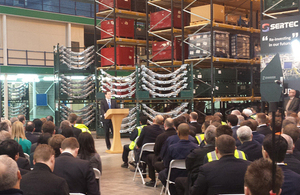Chancellor: Let’s finish the job
Chancellor sets out the economic choice facing Britain in 2014.

Chancellor delivering speech to Sertec
Chancellor George Osborne gave a keynote speech on the economy today (6 January 2014), setting out the economic choice facing Britain in 2014 and explaining the five components of the government’s long-term economic plan to build a stronger, more competitive economy.
The Chancellor was speaking at component manufacturer Sertec Group’s new Head Office in Coleshill, Birmingham, on a day that the company announced that it plans to take on 400 additional people over the next four years.
The Chancellor pointed to evidence that Britain’s hard work is paying off and that, “For the first time in a long time, there’s a real sense that Britain is on the rise.”
But as the New Year begins, he also wanted to warn against any complacency that the hard part of the job is done. The Chancellor said:
That’s why 2014 is the year of hard truths. The year when Britain faces a choice. Do we say: the worst is over; back we go to our bad habits of borrowing and spending and living beyond our means – and let the next generation pay the bill?
Or do we say to ourselves: yes, because of our plan, things are getting better. But there is still a long way to go – and there are big, underlying problems we have to fix in our economy. More repairs. More cuts. More difficult decisions.
That’s the choice in 2014: to go on working through a plan that is delivering for Britain, putting us back in control of our destiny with the security and peace of mind that brings; or squander what we’ve achieved and go back to economic ruin.
Ultimately it’s your choice – a choice for the British people.
He then set out the five components of his long-term economic plan to build a stronger, more competitive, economy to secure a better future for hard-working families and future generations by:
- cutting the deficit
- reducing taxes for hardworking people
- creating more jobs by backing business
- capping immigration and welfare
- delivering the best schools and skills
The chancellor said the current forecasts implied further cuts of around 25 billion over two years by 2017-18. He said based on these current forecasts and assumptions, in order to maintain the pace of departmental spending reductions as in the current spending period, there would need to be a further £12 billion of welfare savings by 2017-18.
More difficult decisions are needed, the Chancellor concluded, adding “let’s finish the job.”